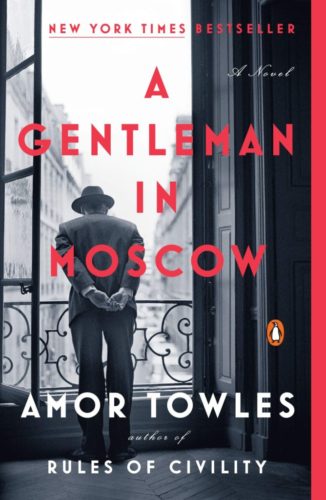Book Review: A Gentleman in Moscow
Walking down bookshelf after bookshelf, I came to a stop at “A Gentleman in Moscow.” I wasn’t sure what made me pick this book up, but I am glad that I did. The book begins during the Bolshevik era. Count Alexander Ilyich Rostov, an aristocrat, is sentenced to a lifetime of imprisonment in the attic room within his hotel, The Metropol. Should he “ever set foot outside of the Metropol”, he would be shot. The count spends the next three decades in this hotel.

During the first few weeks of his stay at the hotel, he attempts to hold his head up high and has no interest in holding any anger or bitterness. In his room, he attempts to read “The Essays of Montaigne” by Michael de Montaigne, a book that belonged to his father, which he had never found the time to read. What better time to read an old thick book than when confined to the luxurious Metropol. He attempts to go about his normal daily routine from visiting the barber to having meals at one of the two restaurants in the Metropol. However, he soon realises his sense of isolation and loneliness a few weeks into his stay. In the hotel, he has meaningful interactions from Emile, the cook with a very short temper, to the very lovely Nina Kulikova, a nine-year old who gives him the pass key to all the rooms in the Hotel, allowing him to create adventures even as she leaves the Hotel. As a result of his interaction with her, the Metropol becomes a world of its own, where the count is able to explore the vast number of rooms and adopts the imaginative capabilities and sense of adventure that Nina provides. Visitors arrive and leave, sharing their tales with the count who attempts to understand the happenings of the outside world.

Apart from the beauty created by the setting of the Metropol, given the time frame, it is set in, A Gentleman in Moscow also explores the rise of Bolshevism after the end of the 1917 Russian Revolution. Various aspects of the class struggle are explored where Towles criticises the Count, a member of the aristocracy, in areas such as his materialism and his elitism. At the time, most Russians were illiterate and it was argued that the class struggle would rectify the lack of progress in development. That being said, the class struggle led by the Bolsheviks often impeded freedom and resulted in major challenges such as famines. The elites of the revolution are in fact portrayed as hypocrites themselves in the novel.
However, this book is more than the worlds that are contained within the Metropol or its historical setting from the Bolshevik Revolution to Khrushchev’s reign. The book carefully and beautifully illustrates friendship, companionship and parenthood in the non-traditional sense. The family that the Count creates in the hotel is able to provide him comfort and solace. Towles also shows how our realities are not shaped by major events in history but rather by the small decisions that we make. Even the smallest interactions have a part to play in shaping our lives in incredibly profound ways that would be hard to imagine, as exemplified through the Count. The setting, the Metropol, is in fact a real hotel in Russia that has stood the test of time till today, and it has been painted beautifully through Towles’ vivid imagery. Every dish or wine that the Count savours can almost be felt through Towles’ description. The pace that he sets his readers through the story is phenomenal, allowing one the right amount of time to linger at each conversation and at each thought the count has.
In all, A Gentleman in Moscow was truly a beautiful read.
By Preeteashwari Jeyaseelan
ReadNUS Events Team
